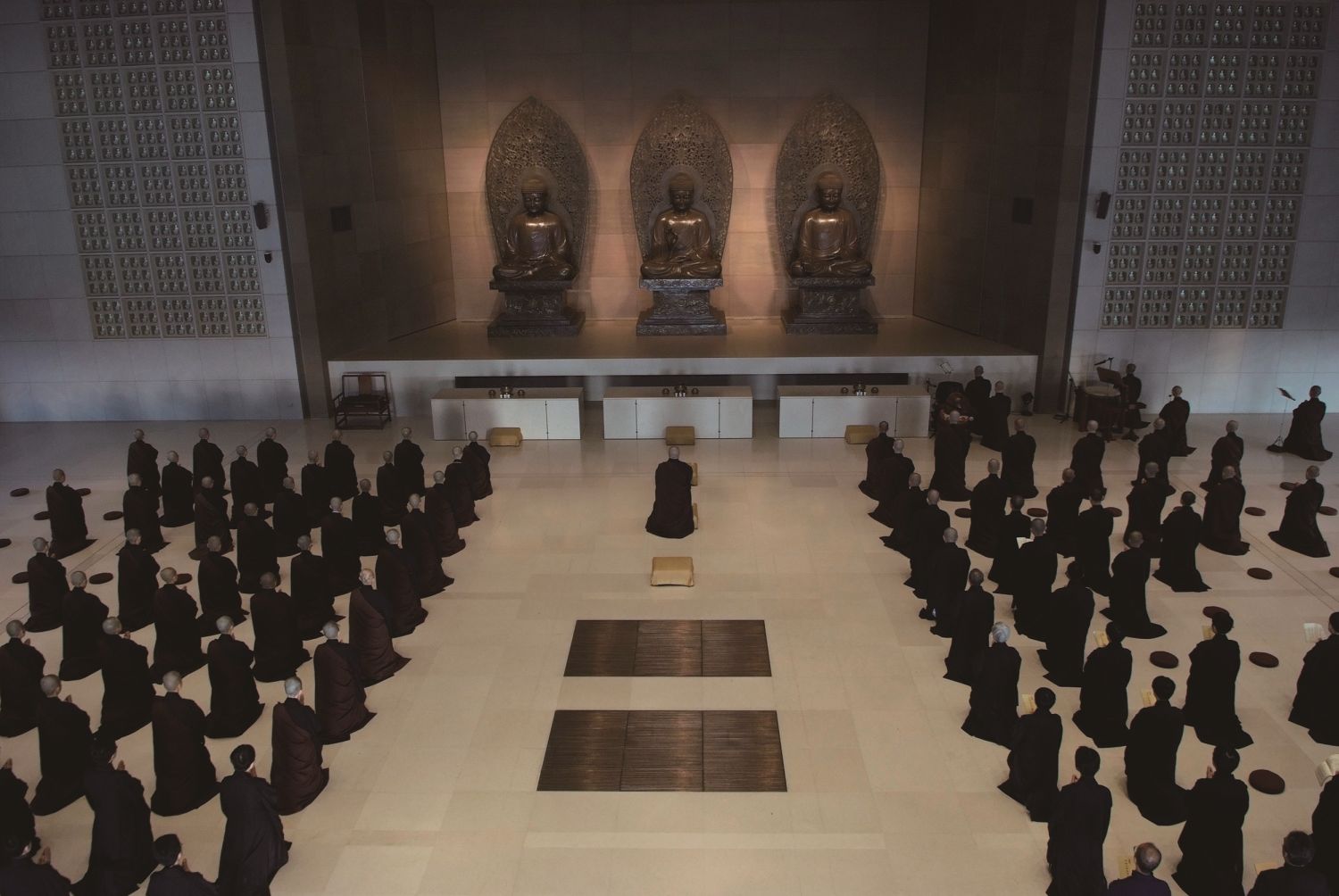Special Topics
Morning and Evening Chanting as a Regular Monastic Practice
As the morning bell tolls at dawn and signals a new day for monastic life, resident monastics file into the main Buddha hall, ready to begin their morning chanting. Echoes of Buddhist chanting in the Buddha hall always have the power to make those hearing it feel calm and peaceful. But, do you know why monastics must participate in morning and evening chanting services?The morning and evening chanting, the Mengshan Food Bestowal ritual (Mengshanshishi), and the breakfast and lunch practices together comprise the five compulsory daily tasks of monastic life. For both morning and evening chanting sessions at Buddhist monasteries, sutras and dharanies/mantras are recited. In addition, Dharma rituals for paying homage to the Three Jewels are performed.
 Daily monastic chanting was first introduced by Master Dao An of the Jin Dynasty. According to the Encyclopedia of Taiwan, "Master Dao An of the Jing Dynasty incorporated daily chanting into the "Rules and Regulations for Buddhist Monks and Nuns" which he compiled", marking the start of the practice of morning and evening chanting at Chinese monasteries." Master Ma Zu of the Tang Dynasty established the system of monastic rules. In the Ming Dynasty, this system had evolved to include the routine practice of morning and evening chanting, which was subsequently widely adopted by Buddhist monasteries.
Daily monastic chanting was first introduced by Master Dao An of the Jin Dynasty. According to the Encyclopedia of Taiwan, "Master Dao An of the Jing Dynasty incorporated daily chanting into the "Rules and Regulations for Buddhist Monks and Nuns" which he compiled", marking the start of the practice of morning and evening chanting at Chinese monasteries." Master Ma Zu of the Tang Dynasty established the system of monastic rules. In the Ming Dynasty, this system had evolved to include the routine practice of morning and evening chanting, which was subsequently widely adopted by Buddhist monasteries.The morning and evening chanting has been much valued by ancestral masters and great practitioners throughout Chinese Buddhist history. It is especially important for monastics, in that, as stated in the Combined Explanation on the Two Chanting Sessions, "A day without morning and evening chanting is like a fine foal without reins". A horse without a bridle is naturally prone to wandering off and thus going further astray from the path if left unchecked. Therefore, monastics must consistently recite these codes and principles at both dawn and dusk as the contents of these recitations serve as a reminder for Buddhist practice, thereby helping the monastics cultivate concentration and develop the bodhi-mind.
What are the contents of the morning and evening chanting?
The contents of the Buddhist morning and evening chanting can be divided into three major parts: 1. The morning chanting begins with the Shurangama Dharani, while the evening chanting begins with the Amitabha Sutra and ends with Buddha-name recitation; 2. Both chanting sessions contain texts for merit dedication and triple refuge, as a general transfer of merit to all. 3. On the first and 15th day of each month according to the lunar calendar, additional invocations are included to pray to guardian deities for their blessing and protection.
Huangbo's Rules of Purity has a description regarding daily reciting/chanting at Chan Buddhist monasteries during the Ming Dynasty. For the morning session, the Shurangama Dharani, the Heart Sutra, the Great Compassion Dharani, and the Ten Short Mantras were recited, coupled with the practice of circumambulating the Buddha while chanting the Buddha's name. The evening session includes recitation of the Amitabha Sutra, the Mengshan Food Bestowal ritual, the Pure-Land Rebirth Dharani, the Heart Sutra, and Samantabhadra Bodhisattva's Verse for Admonition. On every 14th and 30th day of the month according to the lunar calendar, the Amitabha Sutra is recited during the Karma night, along with the Eighty-eight Buddhas Great Repentance Text, to be recited while kneeling. This is similar to the present day's style practiced at Buddhist monasteries. The "five sections of regular recitations" of the Chan School are basically comprised of two sections of recitation for the morning chanting--namely the Shurangama Dharani and the Great Compassion Dharani-- together with the Ten Short Mantras. In addition, it includes three sections of recitation for the evening chanting—the Amitabha Sutra, the Great Repentance Text, and the Mengshan Food Bestowal ritual. All monastics are required to familiarize themselves with these contents.
Extended Reading:
Morning and Evening Chanting as a Regular Monastic Practice
Innovations in Morning and Evening Services in Modern Day Monasteries
Morning and Evening Recitation Helps Mental and Physical Adjustment
The Regular Daily Practice of Venerable Master Sheng Yen
Daily Practice Q & A: Q1: Is it necessary to have a daily practice after studying Buddhism ?
Daily Practice Q & A: Q2: How does one choose a daily regular practice?
Daily Practice Q & A: Q4: What is the difference between preliminary and daily practice?
Photos: Issue 326 of Life Magazine, Dharma Drum Publishing Corporation
Translation: Cheng-yu Chang (張振郁)
Editing: Chia-chen Chang (張家誠), Keith Brown
